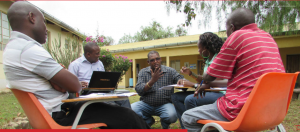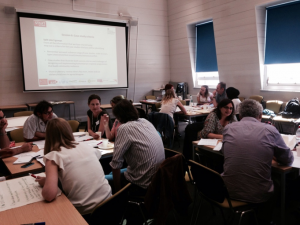Resilience offers a new opportunity to reopen the Linking Relief, Rehabilitation and Development (LRRD) debate and develop practical guidance for improved humanitarian programming. For decades practitioners, policy makers and academics alike have struggled with how to better align short term humanitarian aid and longer term development to reduce vulnerability and chronic poverty. Over the next year I will be visiting and researching up to 10 humanitarian and conflict response case studies and exploring exactly how resilience can be practically utilised to improve international assistance and strengthen community resilience.
by Becky Murphy (Christian Aid and Kings College London)
Becky Murphy is a Resilience Learning and Capacity Building Officer at Christian Aid and a Researcher at Kings College London
Resilience offers a new opportunity to reopen the Linking Relief, Rehabilitation and Development (LRRD) debate and develop practical guidance for improved humanitarian programming. For decades practitioners, policy makers and academics alike have struggled with how to better align short term humanitarian aid and longer term development to reduce vulnerability and chronic poverty.

Over the next year I will be visiting and researching up to 10 humanitarian and conflict response case studies and exploring exactly how resilience can be practically utilised to improve international assistance and strengthen community resilience.
On Thursday the 18th June 2015 the START DEPP Linking Preparedness Resilience and Response in emergency contexts (LPRR) consortia came together at Kings College London to discuss; the debate so far, the progress, the challenges and map out how our project aims to offer new guidance. The Consortia includes; Christian Aid, Action Aid, Concern, Help Age, King’s College London, Muslim Aid, OXFAM, Saferworld and World Vision. All of our consortia have committed to reviewing their ways of working; offer case studies of success and challenges and pilot the new approaches we will co-develop together.
Building Momentum for Change
Ahead of the game our workshop took place just days before the launch of the new G7 report: ‘A New Climate For Peace: taking action on climate and fragility risks’ which very aptly advocates for the sector to better understand the linkages between environmental risks, political fragility and conflict. Here G7 members call for the need for policy makers, practitioners and academics to come together to start mapping out practical ways to improve both humanitarian and development initiatives to fuel and maintain political momentum for the lead up to the UN climate talks in Paris this September.
The Project
The START DEPP LPRR project is a 3 year DfID funded project which aims to develop and test new ways of building community resilience in fragile settings and design humanitarian response interventions in ways which strengthen long-term community resilience. Currently the project’s countries of focus include Bangladesh, Kenya, Democratic Republic of Congo (DRC), Pakistan, Philippines and Myanmar. Potentially this could also be expanded to Lebanon, Columbia, Ethiopia and Indonesia. The project has three strands: (1) Conflict Prevention (2) Humanitarian Response (3) Learning & Capacity Building.
The Workshop
The day was the fourth of a series of LPRR workshops at KCL and provided the opportunity for the consortia to start exploring what improved programming could look like in practice and the multi-layered strategy we need to employ.
The Challenges & Complexities
First, the consortia discussed the main challenges present throughout existing academic and policy literature. Whilst progress has been made 7 core challenges still stand in the way:
1. Funding mechanisms
2. Policy regulations
3. The differences between the humanitarian and development ‘mission’
4. How to work in contexts of protracted crises
5. How to work in contexts of fragile and weak governance
6. The issue of trade-offs. Based on the idea there will be both winners and losers in resilience building, what are we willing to trade off and who are we as the humanitarian and development sector to make such difficult decisions?
7. The lack of practical application, existing tools and guidance
Furthermore a number of additional practical challenges were highlighted:
1. How to build local capacity
2. How to ensure accountability
3. How to work on multi hazard crises
4. The presence of other actors and sources of funding
5. Our analysis and system doesn’t always reflect the realities of people lives
6. How aid is delivered
7. The need to recognise community standards knowledge and norms
Next the consortia shared case studies from Lebanon, Pakistan, The Philippines and Somalia.
What’s next for the Humanitarian Strand?
Over the next two months the project will be taken out to workshops in Kenya and Pakistan and the consortia will work together to identify our list of case studies.
What can the LPRR project bring that’s new?
We want to take the debate forward by capturing real life case studies, voicing filed staff and vulnerable communities’ perceptions and offering and piloting practical guidance for improved programming.
More information
Watch this space for more blogs and updates on the project
For more information on the START DEPP LPRR project please contact Becky Murphy at rmurphy@christian-aid.org
Alternatively visit the project website here: http://www.start-network.org/how/start-build/linking-preparedness-response-resilience/
